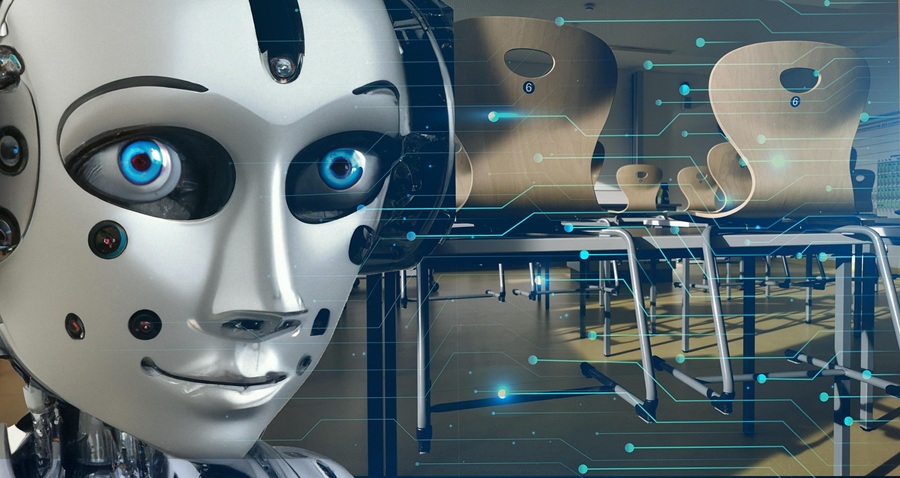- Technology
- 12 de November de 2025
- No Comment
- 7 minutes read
Technological exile

Photo: Alexandra_Koch en Pixabay
Or on the perils of shielding oneself with screens and keeping technology out of the classroom

Those who know me well know I have no problem engaging in debate, as long as it’s respectful. This is especially true when discussing with those at the far end of my ideological spectrum, at what I consider the very foundations of my scientific thinking. What I hold as true are justified beliefs. Following the methods of science and critical thinking, my own knowledge must always be open to revision. What follows is offered with that constructive spirit.
I openly defend the textbook (and pencil and paper), alongside digital technologies. I can understand, even if I do not share—having debated this extensively—those, such as Dr Francisco Villar (especially considering his daily clinical experience), who would remove screens from classrooms entirely, even computer labs, to prevent the digital ills of our time, nipping the problem in the bud.
Many simply do not believe in technological education or in “teaching responsible technology use”. Likely, this is because, in too many contexts, it has been done poorly—or young people have not been equipped with the tools they need to navigate the digital world. It’s not easy, given the sidelining of technology subjects in secondary education and their near invisibility in primary schools (Hernández-Fernández, 2022).
Consider how one might improve students’ spelling or reading comprehension by scrapping language classes. Often, it is argued that every teacher should be a language teacher. Yet without a dedicated subject, the teaching of language falls between two stools. The same applies to technology. Legal mandates alone cannot replace structured technological education.
Avoiding technology in the classroom is abandoning young people to their own devices. The APA has called on psychologists to lead responsible integration of IA in education, guiding decisions with ethical and scientific principles. Just as ignoring sexual education leaves it to pornography, failing to tackle cyberbullying, digital addictions, online social control, netiquette, or digital citizenship allows charlatans, influencers, and even bots generating fake content to exploit the most vulnerable, aided by ever-more sophisticated AI.
On the other hand, we have handed a generation over to the social experiment of digital addiction: succumbing to social media rewards, necks bent over screens. Adults are no exception. Yet, by pendulum effect, in the name of keeping schools safe digitally—a crucial point; schools should always be sanctuaries—fear or ignorance has led to abandoning essential technological education.
Can you educate with laptops closed or pencil and paper? Absolutely. But simulations have limits. Flying a plane is not the same as playing on a simulator. Still, metaphorically, many hours in a simulator are invaluable before piloting a jet. Schools should be controlled environments where learning happens with intention, where technology is both taught and used. Activities should help students grow and mature, becoming responsible digital citizens.
We face a harmful polarisation in young people’s technological education. I am against digital pedagogism and the foolish imposition of screens or AI replacing human reasoning. Yet, I also believe it is highly unrealistic to shield oneself behind screens, to assume that digital isolation in schools will solve the myriads of problems that exist out there, beyond the classrooms and school walls, waiting.
Avoiding discussion and engagement with these issues does not make them disappear. They must be addressed both through tutorial guidance and through technical expertise. Banning mobile phones in secondary schools may improve day-to-day classroom management and ease the Foucaultian burden on teachers, who then have less need to monitor and punish. Whether this will statistically reduce misbehaviour outside the classroom, once authority—and the device—is restored, remains uncertain.
Teachers’ digital competence should not be reduced to a mere certificate: a document confirming completion of a short course in which one might have demonstrated the ability to send an email, use cloud software, or issue a command to an AI. Genuine digital competence entails, among other things, that each teacher, from within their subject, understands and can teach students to survive—and thrive—in the digital jungle, and to understand its nuts and bolts (Lara y Magro, 2025). Naturally, this also includes proficiency with subject-specific software.
Yet, I would argue, this is less important than cultivating thinking individuals prepared for the unavoidable digital world. Through the art and science of didactics, rather than demonising screens, we should consider how best to use them. After all, you may well be craning your neck to look at a screen as you read these lines. Black Mirror.
References:
Focault, M. (1976). Vigilar y castigar. México: Siglo XXI Editores.
Hernández-Fernández, A. (2022). La ignorancia tecnológica. En: (Navarra y Rabadà, eds.) La educación cancelada. Palma de Mallorca: Sloper, 2022, p. 59-81. https://futur.upc.edu/34187794
Lara, T. y Magro, C. (2025). IA y educación. Una relación con costuras. Madrid: Trama Editorial. Biblioteca Digital Journey.
Source: educational EVIDENCE
Rights: Creative Commons

